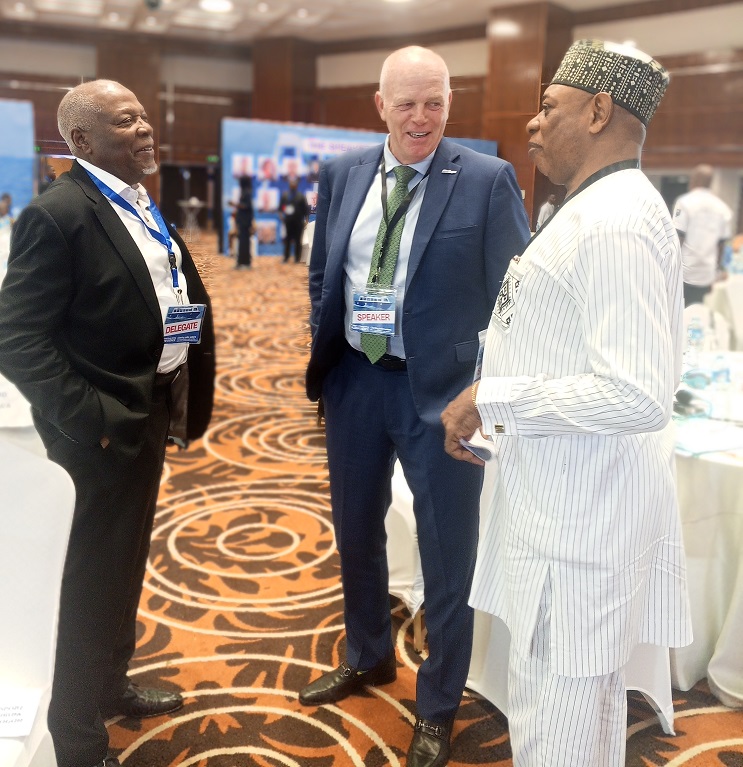Photo Caption
MOWCA, Secretary General, Dr. Paul Adalikwu (Right), flanked by other conference participants
By Ignatius Ushie
As transportation stakeholders gathered in Lagos Nigeria, yesterday and will continue today, for a two day conference to strategise during the Regional Ferry safety conference, even as the Lagos State Government has called for regional collaboration to boost waterways in Lagos and the sub region.
This is as the LASG stressed that a state with over 25 million residents needs a robust ferry transportation system for urban mobility, tourism, and economic prosperity.
Represented by the Deputy Governor, the Lagos State Governor, Mr Babajide Sanwo-Olu, stated this position during the 2025 Regional Ferry Safety Conference, which was organised by the Lagos State Waterways Authority (LASWA), in conjunction with the Maritime Organisation of West and Central Africa (MOWCA) and Interferry Association.
Themed ‘Charting safer waters: advancing ferry safety through innovation, collaboration and integrated transport solutions’. the Deputy Governor of Lagos State, Obafemi Hazmat, stressed the urgent need for enforceable safety frameworks, cutting-edge technology adoption, and harmonised operational standards to secure ferry users across the region.
According to the Governor, the conference is not merely timely, but is essential.
He said “Ferry safety transcends local boundaries; it is a regional imperative. We must forge common safety frameworks, share crucial data and intelligence, standardise training protocols, and embrace innovative technologies that will elevate navigation and emergency response across our waterways.
“In a state like ours, with over 25 million residents, the need for a robust ferry transportation system for urban mobility, tourism, and economic connectivity is undeniable. However, as we embrace this growth, we must simultaneously uphold rigorous, enforceable, and technologically advanced safety standards. This calls for a unified regional effort, and Lagos is ready to lead the charge,” he added.
Also speaking, The Secretary-General of the Maritime Organisation of West and Central Africa, MOWCA, Dr. Paul Adalikwu, said the gathering was to ensure that ferry transport in the subregion was not only efficient and accessible but, above all, safe.
According to him, “The choice to pick Lagos for the conference was predicated on the fact that it is a cosmopolitan city that operates multimodal transport services and has a 22 per cent water coverage area, with an average of about 60,000 daily commuters crisscrossing the mainland and islands. It also acknowledged that the state had put in place a robust water transport authority”.
The MOWCA Secretary General reiterated that the idea was to gather stakeholders in Lagos State to study their model, align it with emerging global best practices, and “explore areas of improvement that will make ferry services safe and attractive options for human and service mobility.”
The Chairman of Interferry, Tim Mooney, noted that the issues and challenges they face in New York are what other countries are facing, urging for collaboration to address the challenges.
In his words, “I am impressed with the LASWA group, from what we experienced when we went round the state. We saw people wearing life jackets in Lagos; this is simply amazing,’’ he said.
Earlier in his remarks, The Managing Director of the National Inland Waterways Authority, NIWA, Bola Oyebamiji, said that one of the responsibilities of NIWA is to provide an alternative mode of transportation for the evacuation of economic goods and persons.
Oyebamiji, who was represented by the Head of Marine, Elsie Egwuatu, said “our mandate is efficiently and effectively in line with global best practices that are safe, seamless and affordable.”
The General Manager of LASWA, Damilola Emmanuel, in his address, reinforced the need for cross-border policy harmonisation and stronger technical standards to ensure that ferry transport becomes a dependable and environmentally sustainable mode of transportation throughout Africa, adding that the need for stronger technical standards and innovative safety practices to ensure ferry transport becomes a dependable and environmentally sustainable mode of transportation across Africa.
“We are here to forge a safer, more resilient future for ferry transport across Africa’s waterways. We must harness innovation, real-time data, and advanced vessel technologies to protect lives and position ferry transport as a key driver in Africa’s blue economy,” he said.
The Lagos State Commissioner for Transportation, Mr Oluwaseun Osiyemi, described maritime safety as a continuous journey that demands vigilance, collaboration, and urgent action.
He emphasised that ferry incidents in any part of the sub-region must be seen as a shared concern.
The conference was addressed by stakeholders across boards, ferry operators, permanent secretaries from Lagos State, Kano Taraba, among others.
Permanent Secretary, Ministry of Transportation, Cross River State, Dr. Gabriel Ogbaji Akwada, represented the state.













